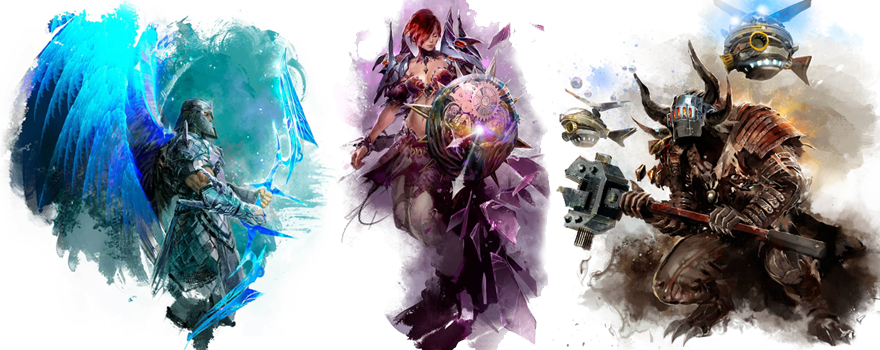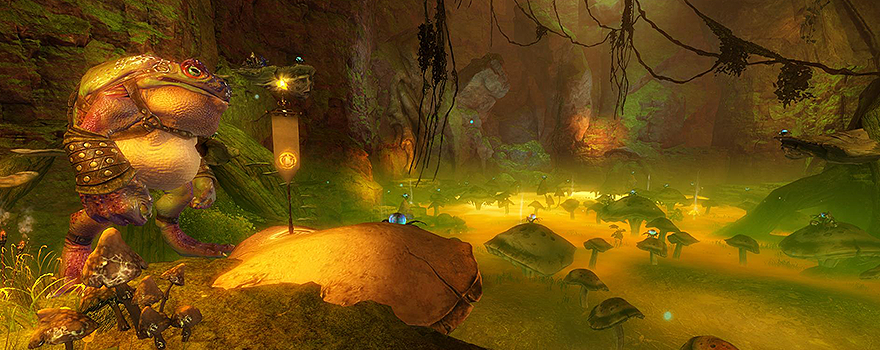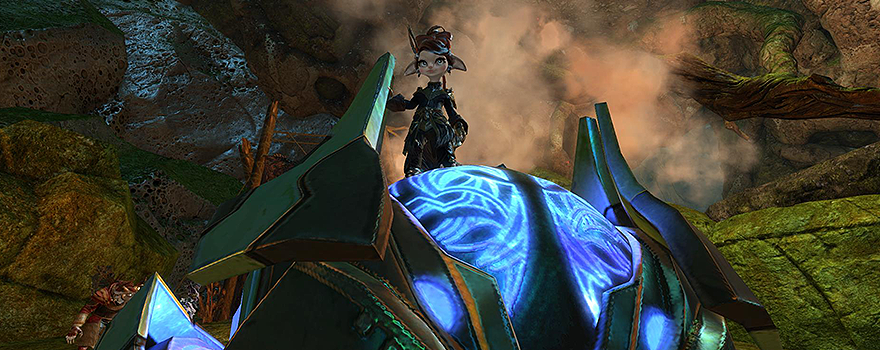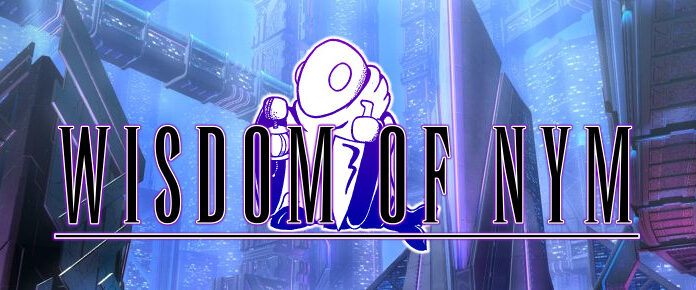
I know I promised you an entry that focused on the changes to the in-game economy as my next installment to the Heart of Thorns launch diary, but a juicy post went live last night on the Guild Wars 2 website that I couldn’t possibly postpone commenting on, so I’ve put my economy entry on hold while I take a look at the iterative development process that drives the expansion. Within a week, we’ve seen several tweaks to the mechanics that were introduced with the expansion, and the latest news is that the ArenaNet team has again addressed player complaints with an iterative development approach. In this launch diary entry, I’ll take a look at the team’s iterative approach and highlight precisely why this is a fantastic way forward for the game.
Another point I’d like to note before I talk about the topic at hand is that I’m now in the original Massively Overpowered [MVOP] guild and am looking for company. Any reader can join us by popping his or her account name in the comments below or in an email, or alternatively you can message me in-game by contacting Tinabeans.8064. Please note that I’m on a free secondary account, so I can’t reply to your in-game mail or whispers unless we’re mutual friends: Don’t panic if I don’t write back!
I’m delighted to see ArenaNet’s proactive approach to fan feedback — both positive and negative — and I really love that the players have a voice in the future direction of the game. Within five days of launch, the ANet team has scoured the expansion feedback on the official forum and even the game’s subReddit in order to iterate on the launch build of Heart of Thorns. I believe that the speed of iteration and corrective patching is in no small part facilitated by how smooth the expansion launch was: Relatively few major bugs marred the launch, allowing the team to quickly get to our concerns and make amends.

Getting on the right side of the fine line between progression and grinding
The first notable change that came as a direct result of player feedback was to the mastery prerequisites for the personal story, as I highlighted in my previous entry. Players no longer need to push to train a tier four mastery to progress with the expansion’s storyline, which is a widely welcomed change that makes the whole experience much more fluid. This was welcome news for me because one of my largest gripes with the expansion was the story’s reliance on mastery training because of how jarring I find it to have to set down the story in order to train up my character.
As welcome as this first change was, ArenaNet realised that there were plenty of other areas in which a little iteration could warm the playerbase to the new expansion and the unique mechanics it has brought to the table. The most significant complaint I have seen within our comments here on Massively Overpowered and in map chat is how long it takes to earn the required amount of points to unlock a character’s elite specialization, especially since each character on a player’s account must separately earn this. Players found the thought of raising 400 hero points on each one of their characters more than a little daunting, so ArenaNet decided to act before those players dropped off and lost heart.
In the latest news post, Game Director Colin Johanson admits that the team were largely responsible for the elite specialization backlash because the true cost of training those specializations was never made clear during beta:
We always viewed the elite specialization as one of the major rewards in expansion—but between the betas and lack of unlock info, we didn’t do a great job properly aligning expectations on how your elite specialization is earned. This left some players in a position where they expected to have their elite specialization very early on (or immediately!) in Guild Wars 2: Heart of Thorns. Our goal was always to have elite specializations as a part of character progression, but it’s clear that a segment of our players was so excited about the elite specialization system and abilities that they really wanted to experience most of the expansion with them unlocked.
As much as I appreciate that the elite specializations represent another form of horizontal progression, much like the mastery system does as I alluded to before, I did find the hero point cost to be unreasonably high, so I most definitely welcome the drop from 400 points to a much more reasonable 250. Players who have already unlocked their elite spec will receive a refund for the excess hero points for future use, so at least nobody is permanently disadvantaged by the swift backtrack.

Adventures will be much more accessible in future
One of the issues caused by having such a multi-layered, vertically dense map is that sometimes activities conflict with one another, meaning that some form of compromise must be reached in that some activities must temporarily be suspended when others are in play. The new Heart of Thorns adventures are brilliant fun and each medal earned comes with a sizeable chunk of much-needed experience that softens the training of masteries, so you can imagine how in-demand these activities are. Adventures, however, are frequently closed because of event chains in the surrounding area: If an event is open on top of the adventure, it is closed to prevent it breaking.
Players were disappointed by the conflicts, so the team has decided to open the adventures that are less susceptible to event chains more often, only closing them when map-driven activities such as getting the camps through the night are occurring in order to keep player attention on the more pressing events when their help is needed. The blog post takes a sensible approach: Players should have reasonable options open to them as much as possible, but I see the logic behind not opening fun adventures in times of distress in a zone.

Map filling bugs are being squashed too
One of the most fundamental iterations to the expansion will be the improvement of the megaserver map generation. Low population maps have been responsible for the new zones being that much harder to run as a solo player, and before I realised that the issue lay with a map population issue, I was genuinely concerned that in the quest for a challenging endgame experience, the team at ArenaNet had overshot the difficulty mark for which it was aiming. I know several readers have mirrored my concerns in the comments, so I’m most definitely hoping that iterating on the map generation system will help.
Right now, safety in numbers is a large part of surviving the challenges thrown at us in the Heart of Maguuma, and the event chains centre on gathering the players within each zone to rally against the forces of Mordremoth. When we play on low population maps, we lose the ability to join forces with other players to face the challenge collectively, which can at times push the challenge into the unrealistic category. I’ll be glad to see higher populations and a higher potential for a comfortable solo experience for those who prefer it.

Why an iterative approach is best
If you’ve ever checked out my game project, you’ll know that player-led iterative development is a must-have on my list that elevates a good game into the great game category. Sure, there has to be a line between rolling over to every player’s individual fleeting whim and actively iterating on your project to suit the audience at hand, but it’s very seldom that a project has too much player involvement. Listening to those who are most engaged with your product is, in my opinion, the only way to develop: The trust and improvements made are totally worth the effort of exploring feedback to find trends in opinion.
Iterative development gives a development team a vital opportunity to modify approaches and systems that switch off the target audience, and for this reason, it’s even more important once you’ve just released an expansion, and also when you have players’ money in hand and want to keep them playing for longer. Losing a proportion of the playerbase because of an initial problem within a system is a preventable shame, especially for an MMO in which the game’s long-term success is determined by the activity of its audience.
ArenaNet is fantastic at keeping its ear to the ground, and I think this is one of the biggest reasons for its relative success. I’m sure that we’ll continue to see this iterative approach to the expansion’s ongoing development as more features are released over the next few weeks and months, particularly when it comes to the team’s new pet feature, raiding. I’m hoping that together we’ll make it an experience to remember.
Check back soon for the promised entry on the shifts in GW2‘s economy since the expansion’s launch caused by fractal, dungeons, and crafting changes, and be sure to read back on previous entries if you’ve missed them up to this point:

















